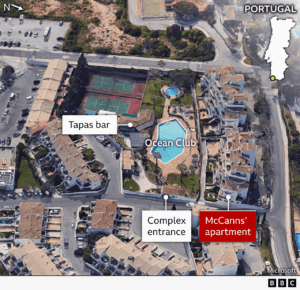The disappearance of Madeleine McCann, a three-year-old British girl, on May 3, 2007, from a holiday apartment in Praia da Luz, Portugal, remains one of the most high-profile missing persons cases in modern history. Despite extensive investigations by Portuguese, British, and German authorities, the case remains unresolved, with no definitive evidence of Madeleine’s fate. This article provides a comprehensive, scientifically grounded overview of the timeline, investigative efforts, and current status of the case, synthesizing key developments while maintaining clarity for a broad audience.
The Incident: May 3, 2007
On the evening of May 3, 2007, Madeleine McCann was reported missing from her family’s ground-floor apartment at the Ocean Club resort in Praia da Luz, a coastal village in Portugal’s Algarve region. Madeleine, along with her two-year-old twin siblings, was left asleep in the apartment while their parents, Kate and Gerry McCann, dined with friends at a tapas restaurant approximately 55 meters away. The parents conducted periodic checks on the children throughout the evening. At around 21:00, Gerry McCann checked and found all three children asleep. However, when Kate McCann performed a check at 22:00, she discovered Madeleine was gone. The window in the children’s bedroom was open, and the shutter was raised, suggesting a possible point of entry or exit.

The immediate response involved hotel staff and guests searching the resort complex, while Portuguese police (Polícia Judiciária, PJ) were notified and initiated an investigation. The initial hypothesis was that Madeleine had been abducted, given the absence of signs of a struggle and the open window.
Early Investigation (2007–2008)
The Portuguese police led the initial investigation, focusing on the abduction theory. On May 26, 2007, a sighting reported by Irish holidaymakers Martin and Mary Smith became significant. They described seeing a man carrying a child matching Madeleine’s description—blonde, wearing light-colored pajamas, and barefoot—at around 22:00 on Rua da Escola Primária, approximately 500 yards from the McCanns’ apartment. This sighting later informed the timeline of the suspected kidnapping.
However, the early investigation faced challenges. In June 2007, a Portuguese police chief admitted that vital forensic evidence may have been lost due to inadequate preservation of the crime scene. In July, British police provided sniffer dogs to assist, which detected traces of blood in the apartment and the McCanns’ rental car, hired 25 days after the disappearance. These findings shifted the investigation toward a possible homicide, with speculation that Madeleine had died in the apartment, accidentally or otherwise.

By August 2007, after 100 days without significant leads, Portuguese authorities publicly acknowledged that Madeleine might not be alive. In September, Kate and Gerry McCann were named “arguidos” (formal suspects) based on forensic evidence, including alleged DNA traces in the rental car. The McCanns denied any involvement, and the evidence was later deemed inconclusive due to contamination risks and the time gap between the disappearance and the car’s rental. On October 2, 2007, Chief Inspector Gonçalo Amaral was removed from the case after criticizing British police, highlighting tensions between the two forces.
In July 2008, the Portuguese investigation was archived due to insufficient evidence, and the McCanns’ arguido status was lifted. The case appeared stalled, with no arrests or concrete leads.
Renewed Efforts: Operation Grange (2011–2015)
In 2011, prompted by public pressure and a request from then-Home Secretary Theresa May, the Metropolitan Police in the UK launched Operation Grange, a formal investigation into Madeleine’s disappearance. Led by Commander Simon Foy, the operation initially involved 37 officers and treated the case as a “criminal act by a stranger,” likely an abduction or a burglary gone wrong. The McCanns employed private investigators during this period, funded by Madeleine’s Fund, which raised millions through public donations and media deals.
In 2013, Operation Grange yielded significant developments. Scotland Yard released e-fit images of a man seen carrying a child toward the beach on the night of May 3, 2007, aligning with the Smith sighting. This man was described as mid-30s, 5’7”–5’9”, slim-to-normal build, with short brown hair and cream or beige trousers. The focus on this sighting led to the dismissal of an earlier sighting by Jane Tanner, a friend of the McCanns, as unrelated. That October, the Metropolitan Police identified 41 potential suspects, and the BBC’s Crimewatch program broadcasted the e-fit, prompting public tips.
In 2014, British detectives conducted searches in Praia da Luz, including scrubland near the Ocean Club, and interviewed four individuals, but no new evidence emerged. By 2015, Operation Grange was scaled back to four officers, though investigators emphasized they were pursuing a “significant line of inquiry.” The operation’s cost, exceeding £10 million by 2015, drew scrutiny, but funding continued.
The Emergence of Christian Brueckner (2020–Present)
A major shift occurred in June 2020 when German authorities, led by Braunschweig prosecutor Hans Christian Wolters, identified Christian Brueckner, a 48-year-old German national, as the prime suspect. Brueckner, a convicted sex offender with a history of child sexual abuse and burglary, lived in the Algarve between 1995 and 2007, including in Praia da Luz at the time of Madeleine’s disappearance. German police claimed to have evidence suggesting Madeleine was dead and that Brueckner was responsible, though they did not disclose specifics, citing the ongoing investigation.

Brueckner’s criminal history bolstered suspicions. He was serving a seven-year sentence in Germany for the 2005 rape of a 72-year-old American woman in Praia da Luz and had prior convictions for sexual offenses against children in 1994 and 2016. A 2016 search of a property he owned uncovered disturbing materials, including writings about abducting and abusing children, 75 adolescent girls’ swimsuits, and photographs depicting child abuse. A witness, Helge Busching, claimed Brueckner had confessed to him that Madeleine “didn’t scream,” implying involvement, though Busching’s credibility has been questioned.
In April 2022, Portuguese authorities formally named Brueckner an “arguido,” aligning with German and British efforts. In May 2023, a joint search by Portuguese, German, and British police targeted the Arade Dam, 50 km from Praia da Luz, where Brueckner was known to have spent time. The search, prompted by tips, used divers and sniffer dogs but yielded only minor materials, with no conclusive findings.
The most recent search occurred in June 2025, covering 21 plots of land near Praia da Luz, between the Ocean Club and Brueckner’s former residence. German and Portuguese police employed ground-penetrating radar, drones, and excavators, but the three-day operation, costing an estimated £300,000, uncovered only animal bones and clothing fragments. The lack of significant findings dampened hopes for a breakthrough, and authorities have not released further details, suggesting the results may remain inconclusive for weeks.
Current Status and Challenges
As of June 2025, the investigation remains active but unresolved. Operation Grange, now costing over £13.3 million, continues with minimal staff, focusing on limited leads. Brueckner, due for release from prison in September 2025 (or January 2026 if he fails to pay a fine), remains the primary suspect but has not been charged in connection with Madeleine’s disappearance. German authorities fear he may flee to a country without an extradition treaty upon release, complicating efforts to bring him to justice.

The case faces several scientific and logistical challenges. The initial failure to secure the crime scene compromised forensic evidence, limiting DNA and trace analysis. The passage of time—over 18 years—has degraded potential evidence and faded witness memories. Conflicting theories, from abduction to accidental death, have muddled the investigation, while media scrutiny and public speculation have pressured authorities, sometimes leading to premature conclusions. The lack of a body or definitive physical evidence continues to hinder closure.
Societal and Psychological Impact
The McCann case has had a profound impact on public consciousness, raising awareness about child safety and the vulnerabilities of holiday resorts. Kate and Gerry McCann have endured immense personal grief, compounded by their brief status as suspects and ongoing media scrutiny. Their resilience, supported by Madeleine’s Fund, has sustained advocacy efforts, including the Find Madeleine website and campaigns for missing children. The case has also spurred debates about parental responsibility, media ethics, and the allocation of investigative resources, given the disproportionate funding compared to other missing persons cases.
Conclusion
The disappearance of Madeleine McCann is a complex, unresolved case that highlights the challenges of investigating high-profile missing persons incidents. Despite extensive efforts across multiple jurisdictions, the absence of conclusive evidence leaves Madeleine’s fate uncertain. The focus on Christian Brueckner offers a promising lead, but without charges or new findings, the case risks remaining a mystery. Continued scientific rigor, international cooperation, and public support are essential to achieving closure for the McCann family and the global community that has followed this tragedy for nearly two decades.





